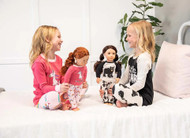How Young is Too Young for a Sleepover?
Posted by Lazy One on 26th May 2023
Going to their first sleepover is a big deal when you're a kid. But how do you know when your child is ready? And how young is too young? After all, you don't want to send them off and then receive a call to pick them up in the middle of the night.
Most sources agree that kids are ready for sleepovers between the ages of 7 and 9 years old. Every child is unique, though, so it's better to trust your parenting instincts instead of going solely off of age. Keep communication with your children as open as possible, and practice a little trial and error.
First thing's first: you need to let your child know exactly what a sleepover entails. They may THINK they're ready to stay the night at a friend's house, but if you explain to them that you aren't going to be there and that they'll have to go to sleep without their regular bedtime routine, they may change their mind and decide that they aren't quite ready yet. On the other hand, they could think they're totally ready, get to their friend's house, and then change their mind. This is where trial and error kicks in!
When it comes to testing the sleepover waters, one method involves moving your child through four stages: hosting a sleep-under, attending a sleep-under, hosting a sleepover, and then attending a sleepover. Remember, it's always better to move from hosting to attending in order to ease your child into the world of sleepovers as painlessly as possible. It's just as important to make sure that your child has the social skills required of a sleepover as it is to make sure they don't suffer from separation anxiety!
STEP ONE: HOSTING (THEN ATTENDING) A SLEEP-UNDER
Contrary to popular opinion, your child doesn't have to jump into a full-on sleepover right away. They could start with hosting a sleep-under, which is a party where your child and their friends do all the things that a normal sleepover would entail EXCEPT staying the night. This is an especially good option for kids who are on the younger end of the seven to nine-year-old spectrum. Having a sleep-under, with one friend instead of three or four, will allow you to test whether or not your child has developed the social skills necessary to handle conflict that arises as they play with their friend for hours at a time.
Once they have hosted their first sleep-under, and everything went well, plan to have them attend the next sleepover at a friend's. This process will allow you to assess your child's social skills without having to worry about picking them up if things go poorly. A lot of parents are so worried about their child having separation anxiety that they don't even think about how well the kids at the party will get along with each other. Between fighting over activities and growing tired of one another's company, it could be that your child isn't ready to be around other children for extended periods of time. If it turns out your child isn't quite ready yet, no worries; keep revisiting the sleep-under until a little progress is made.
STEP TWO: HOSTING (THEN ATTENDING) A SLEEPOVER
When it's time to move on to an actual sleepover, start by offering to host. That way, your child gets a taste of what it will be like to be with their friend all night long without staying in another person's house! There is a marked difference between your child playing with a friend for a few hours in the night and playing, sleeping, and waking up with their friend still present. You may find that not all of your child's friends become "sleepover friends" since some children just don't do well together over long periods of time. That's okay! If your children experience social fatigue around a certain person or group of friends, remind them that it's perfectly normal and okay. They don't need to have sleepovers all the time or even all at once.
Once your child is comfortable with the people they've invited over, and once they seem confident in their conflict resolution skills, it may be time to send them off for their first away-from-home sleepover. This can be a scary time for both the children and their parents, but it doesn't have to be! After all, this is the moment everyone's been working towards. Keep a positive, upbeat attitude about the sleepover when you're talking with your children so that your anxiety doesn't rub off on them.
Remember: building the confidence and social skills necessary for a successful sleepover takes time. It could be that they get homesick their first (and second) time away, and that's okay! If that happens, you haven't failed in preparing your child for a sleepover; it just means that you have to keep working with your children to bolster their sense of independence. Practice makes perfect!
FINAL THOUGHTS
There is no perfect age for your child's first sleepover. It's all about social developmental milestones, communication, and, of course, trial and error. We wish all of the parents lots of luck! You've got this!
Oh, wait! We forgot to mention pajamas ?. Just kidding. There is an argument to making sure your kids stick to as much of their routine as they can when they go to a sleepover, so wearing familiar pajamas and taking their own pillow can help with that...But you know, our articles don't ALWAYS have to mention super awesome, fun and comfy pajamas, right?

